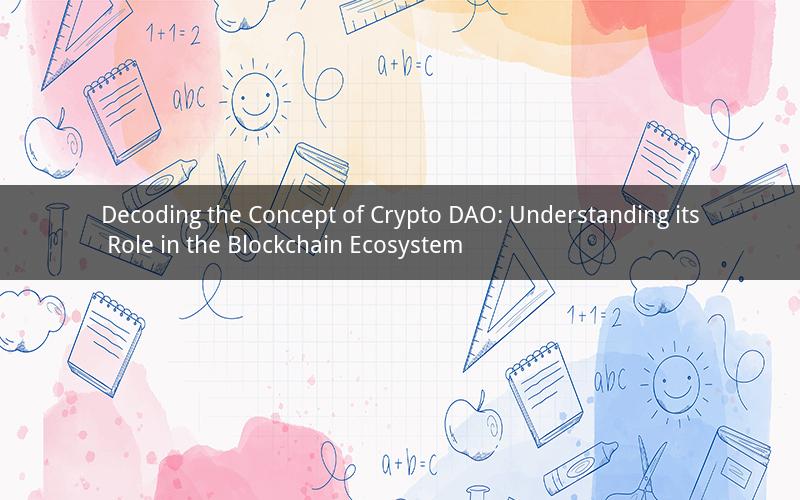
The term "Crypto DAO" has gained significant traction in recent years, especially within the blockchain and cryptocurrency communities. As the blockchain technology continues to evolve, the concept of Crypto DAO has emerged as a pivotal element in shaping the future of decentralized governance. This article aims to delve into the intricacies of Crypto DAO, exploring its definition, functioning, and its impact on the blockchain ecosystem.
What is a Crypto DAO?
A Crypto DAO, or Decentralized Autonomous Organization, is a blockchain-based entity that operates through smart contracts and decentralized governance. Unlike traditional organizations, Crypto DAOs do not have a central authority figure or management structure. Instead, they are governed by a set of rules encoded in smart contracts, which are immutable and transparent.
The core principle of a Crypto DAO is to enable decentralized decision-making, where members have a say in the organization's operations. This is achieved by giving each member a certain number of tokens, which represent their stake in the organization. The more tokens a member holds, the greater their influence over decision-making processes.
How Does a Crypto DAO Function?
The functioning of a Crypto DAO is based on a few key components:
1. Tokens: Tokens are the primary medium of exchange within a Crypto DAO. They are used to represent ownership, voting rights, and governance power. Members acquire tokens through various means, such as initial coin offerings (ICOs), token sales, or participation in the DAO's ecosystem.
2. Smart Contracts: Smart contracts are self-executing contracts with the terms of the agreement directly written into lines of code. In the context of a Crypto DAO, smart contracts are used to enforce rules, automate processes, and facilitate decision-making. They ensure transparency and eliminate the need for intermediaries.
3. Governance: Governance in a Crypto DAO is decentralized and community-driven. Decisions are made through a voting process, where members can propose, discuss, and vote on various issues. The voting power is typically proportional to the number of tokens a member holds.
4. Transparency: One of the key advantages of Crypto DAOs is their inherent transparency. All transactions, decisions, and interactions are recorded on the blockchain, making it easy for members to verify the organization's activities.
The Impact of Crypto DAOs on the Blockchain Ecosystem
Crypto DAOs have several implications for the blockchain ecosystem:
1. Decentralization: Crypto DAOs promote decentralization by eliminating the need for centralized authorities. This allows for more inclusive and democratic governance structures, where every member has a voice.
2. Innovation: The decentralized nature of Crypto DAOs fosters innovation by encouraging the development of new projects and ideas. Since there is no central authority to approve or reject proposals, members can freely experiment with different approaches.
3. Transparency: The transparency of Crypto DAOs makes it easier for members to trust the organization's operations. With all transactions and decisions recorded on the blockchain, members can verify the organization's activities and hold it accountable.
4. Cost Reduction: By eliminating intermediaries and streamlining processes, Crypto DAOs can significantly reduce costs. This makes it more accessible for individuals and organizations to participate in governance and decision-making processes.
5. Increased Efficiency: The automated nature of Crypto DAOs can lead to increased efficiency in various aspects, such as decision-making, transaction processing, and record-keeping.
Frequently Asked Questions (FAQs)
Q1: What is the difference between a Crypto DAO and a traditional corporation?
A1: The main difference lies in their governance structures. While traditional corporations are governed by a central authority, Crypto DAOs operate through decentralized governance, where decisions are made by members based on their token holdings.
Q2: Can anyone join a Crypto DAO?
A2: Yes, anyone can join a Crypto DAO, provided they acquire the necessary tokens. However, the level of influence a member has is typically proportional to their token holdings.
Q3: How do Crypto DAOs ensure security?
A3: Crypto DAOs ensure security through the use of blockchain technology and smart contracts. The immutable nature of the blockchain and the self-executing nature of smart contracts make it difficult for hackers to tamper with the organization's operations.
Q4: Can a Crypto DAO be dissolved?
A4: Yes, a Crypto DAO can be dissolved through a voting process, where members can propose and vote on the dissolution of the organization.
Q5: Are there any risks associated with investing in a Crypto DAO?
A5: Like any investment, there are risks associated with investing in a Crypto DAO. These risks include market volatility, regulatory uncertainties, and the potential for project failure. It is crucial for investors to conduct thorough research and due diligence before investing.